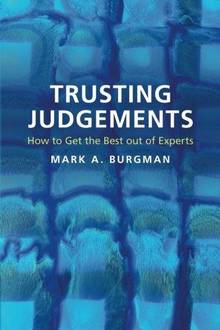Trusting judgements : How to get the best out of experts
Burgman, Mark A.
Éditeur : CAMBRIDGE UNIVERSITY PRESS
ISBN papier: 9781107531024
Parution : 2016
Code produit : 1319791
Catégorisation :
Livres /
Science /
Littérature scientifique /
Essais scientifiques
Formats disponibles
| Format | Qté. disp. | Prix* | Commander |
|---|---|---|---|
| Livre papier | En rupture de stock** |
Prix membre : 39,62 $ Prix non-membre : 41,70 $ |
*Les prix sont en dollars canadien. Taxes et frais de livraison en sus.
**Ce produits est en rupture de stock mais sera expédié dès qu'ils sera disponible.
Description
Policy- and decision-makers in government and industry constantly face important decisions without full knowledge of all the facts. They rely routinely on expert advice to fill critical scientific knowledge gaps. There are unprecedented opportunities for experts to influence decisions. Yet even the most experienced can be over-confident and error-prone, and the hidden risk is that scientists and other experts can over-reach, often with good intentions, placing more weight on the evidence they provide than is warranted. This book describes how to identify potentially risky advice, explains why group judgements outperform individual estimates, and provides an accessible and up-to-date guide to the science of expert judgement. Finally, and importantly, it outlines a simple, practical framework that will help policy- and decision-makers to ensure that the advice that they receive is relatively reliable and accurate, thus substantially improving the quality of information on which critical decisions are made.























